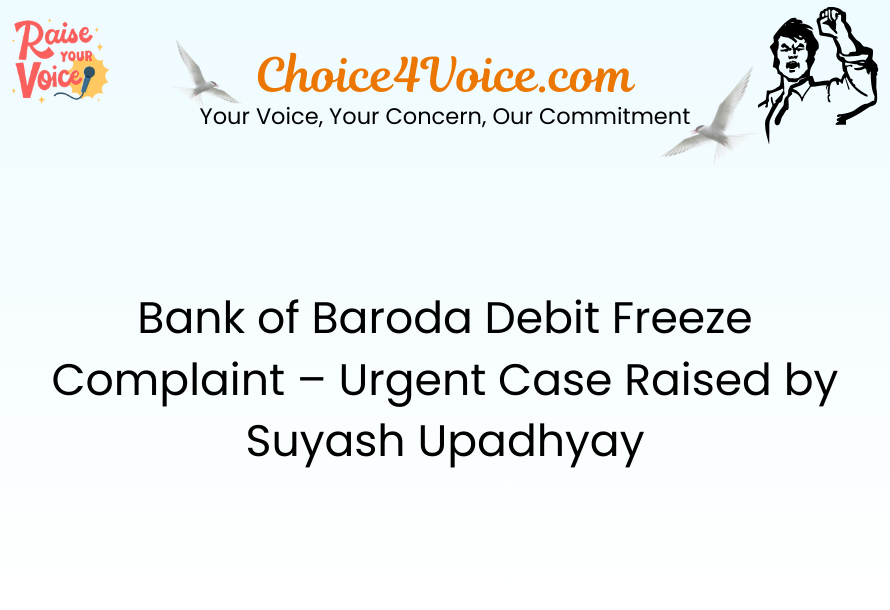Arpit Bhatia alleges Care Health Insurance denied his father’s brain haemorrhage treatment claim at Sarvodaya Hospital despite prior disclosure of diabetes. Learn legal remedies under IRDAI and Consumer Protection Act.
Complaint Summary : Care Health Insurance Denies Cashless Claim for Brain Haemorrhage Treatment – Arpit Bhatia Raises Serious Allegations
| Details | Information |
|---|---|
| Complainant Name | Arpit Bhatia |
| Affected Person | Mr. Rajendra Bhatia (Father) |
| Company/Brand | Care Health Insurance |
| Complaint Type | Cashless Claim Denied |
| Product/Service | Health Insurance Policy |
| Hospital Involved | Sarvodaya Hospital, Faridabad |
| Issue Description | Claim denied on grounds of a newly diagnosed condition (less than a month old) and diabetes, despite diabetes being disclosed at the time of policy purchase. |
| Date of Incident | 12th September 2025 |
| Company’s Response | Outright denial citing technical reasons |
| Additional Comments | Family alleges unethical practices and betrayal of trust. |
Full Complaint Write-Up
On 12th September 2025, Mr. Rajendra Bhatia was admitted to Sarvodaya Hospital, Faridabad for treatment of a brain haemorrhage. His son, Arpit Bhatia, expected that the health insurance policy purchased from Care Health Insurance would provide the promised cashless claim facility.
Instead, the insurer denied the claim outright. The reasons given were:
- A medical condition diagnosed less than a month ago – something impossible to declare at the time of policy purchase.
- Diabetes, which had already been disclosed upfront when buying the policy.
The denial has not only caused financial distress but also left the family feeling betrayed by a system meant to protect them. Arpit Bhatia calls this denial unethical, unacceptable, and a violation of trust at the most vulnerable moment.
Legal and Consumer Rights Perspective
- Insurance Act, 1938 & IRDAI Regulations require insurers to process claims in good faith.
- Denial for newly diagnosed conditions may be considered a bad faith practice.
- Customers have the right to challenge such decisions before:
- IRDAI (Regulator)
- Insurance Ombudsman
- Consumer Court under the Consumer Protection Act, 2019
If proven, the insurer can be directed to release the claim amount, pay compensation for harassment, and cover legal costs.
Step-by-Step Legal Remedies
If you face a similar claim denial, here’s a practical guide to seeking justice:
1. File a Complaint with IRDAI (IGMS Portal)
- Visit IRDAI IGMS Portal.
- Register your account with policy details, insurer name, and complaint description.
- Upload supporting documents: policy copy, hospital bills, denial letter, medical records.
- IRDAI will forward your case to the insurer and monitor resolution.
Timeline: Insurer must respond within 15 days.
2. Approach the Insurance Ombudsman
If IRDAI’s process does not resolve the issue, escalate to the Insurance Ombudsman.
- File an application with details of the dispute and attach supporting documents.
- Each region has a designated Ombudsman office (check IRDAI website for locations).
- The Ombudsman can order settlement up to ₹30 lakhs.
Timeline: Case is typically resolved within 90 days, much faster than regular courts.
3. File a Case in Consumer Court
If both IRDAI and the Ombudsman fail, you can approach the Consumer Disputes Redressal Commission.
- File under Consumer Protection Act, 2019 for deficiency of service.
- Claim refund, interest, and compensation for mental agony.
- You can hire a consumer rights lawyer or file directly without one.
How Choice4Voice.com Helps
At Choice4Voice.com, we amplify genuine consumer grievances and ensure they reach the right platforms. By documenting cases like this, we create public pressure on corporations and also guide victims towards legal remedies.
This case highlights how insurance companies sometimes misuse technicalities to deny claims. We urge Care Health Insurance to act responsibly and honor their commitment.
Frequently Asked Questions (FAQs)
Q1: Can insurers deny claims for conditions diagnosed after policy purchase?
A: Generally no, unless explicitly excluded in policy terms. Such denials are often challengeable.
Q2: Is diabetes a valid ground for denial if disclosed earlier?
A: No. Once disclosed, it is treated as a pre-existing condition subject to waiting periods.
Q3: How can IRDAI help policyholders?
A: Through its IGMS portal, IRDAI monitors complaints and directs insurers to comply with regulations.
Q4: What is the role of the Insurance Ombudsman?
A: The Ombudsman provides an inexpensive, fast-track resolution for disputes up to ₹30 lakhs.
Q5: Can compensation be claimed for mental harassment?
A: Yes. Consumer Courts often award damages for emotional and financial distress.
Q6: What documents should be kept for filing a case?
A: Policy copy, denial letter, hospital documents, bills, and correspondence with insurer.
Q7: How long does the Ombudsman process take?
A: Usually within 3 months, making it a quicker remedy than civil litigation.
Q8: What happens if the insurer still refuses after Ombudsman ruling?
A: You can escalate to Consumer Court for enforcement and higher compensation.
Q9: Does IRDAI penalize insurers for unfair practices?
A: Yes, IRDAI can impose fines, issue directions, or even suspend licenses for repeated violations.
Q10: How does Choice4Voice.com help consumers?
A: By publishing complaints, guiding legal options, and creating public accountability for companies.
👉 Original LinkedIn Post URL: Click Here



